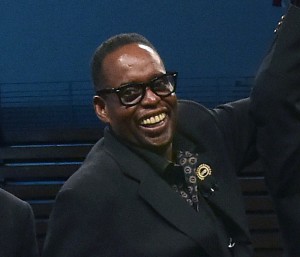
UAW Vice President Jimmy Settles spoke about the negotiating strategy with Ford and what's important in those talks.
The UAW appears willing to discuss trading raises and elimination of second-tier wages for job security in its negotiations with Ford Motor Co.
Ford’s profitability in recent years, including the record $2.6 billion it earned in the second quarter of this year, have many union members salivating at the prospect of big raises or even the elimination of the second-tier.
UAW Vice President Jimmy Settles appears less concerned about getting into the automaker’s bank account than he is about securing jobs. He told the Detroit Free Press ensuring the long-term viability of the company ensures the long-term viability of those jobs.
“What we do is negotiate smart. We don’t negotiate for today. We negotiate for future,” Settles told the Free Press. “We are not negotiating to try to put anybody out of business.”
Settles said the cyclical nature of the automotive industry needs to be accounted for in these talks. The goal is to make sure union members keep jobs in the sluggish part of the cycle.
Key issues in this set of talks include finding a way to resolve the first-tier/second-tier wage disparity. Entry-level workers (second-tier) make between $15.78 per hour and earn a maximum of $19.28 per hour, while those hired before 2007 (first-tier) make an average of $28 per hour.
That goal has to be met while giving the first-tier workers a raise. However, a tour of social media outlets set up by Ford-UAW employees shows a level of skepticism about the negotiations that Settles comments are unlikely to change.
(Move to Mexico makes Ford potential UAW target. For more, Click Here.)
While the overwhelming sentiment is that a better contract is necessary, there’s a rumor floating that Ford is offering a $15,000 payment to workers to simply renew the current pact without substantive changes.
Settles told the Freep that talks are ongoing, beginning at 6 a.m. daily and extending well into the evening on many occasions. The current four-year contract ends on Sept. 14.
“In our negotiations with Ford we deal with small (issues) … and then we move up,” Settles said. “We are at – I call it the honeymoon stage – we are getting the low-hanging fruit.”
In addition to the wages, another large issue that secures jobs is the movement of products to Mexico. The automaker recently announced it would be moving production of its Ford Focus and C-Max compacts from their current plant in Wayne, Michigan, to an unnamed facility.
(Click Here for more details about talks between Ford and the UAW.)
Ford in April said it was investing $2.5 billion in the Mexico for a new engine and transmission plant, thus it became the most likely option where the two vehicles will land. While putting on its best smile, the UAW said production of the vehicles were being moved to Mexico, but that they were confident there would be something taking their place at the Michigan plant.
Still, any movement to Mexico is a problem.
“Mexico continues to be an issue for us,” UAW President Williams said during his comments kicking off the talks. “I want everything to be built in the United States, including tennis shoes.”
Williams is so concerned about the impact that Mexico is having on U.S. workers, he discussed it last Friday with U.S. Labor Secretary Thomas Perez and President Barack Obama at the White House. He told the pair that free trade agreements are hurting U.S. manufacturing.
(To see how hackers took down a Tesla Model S, Click Here.)
He said the had a plan to help Mexican workers, but declined to elaborate on it at the time, saying only, “They’ve got good laws that they don’t enforce.”
